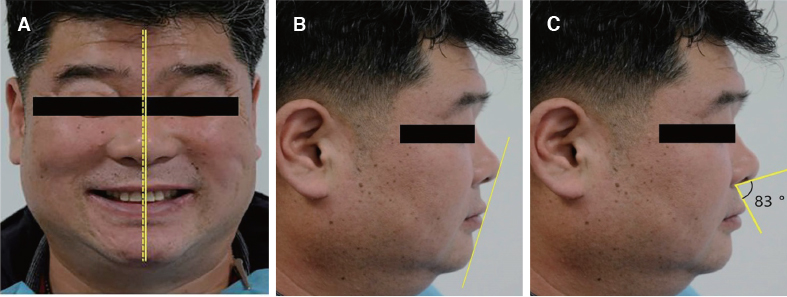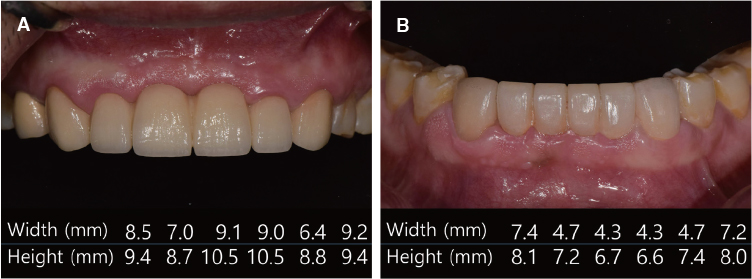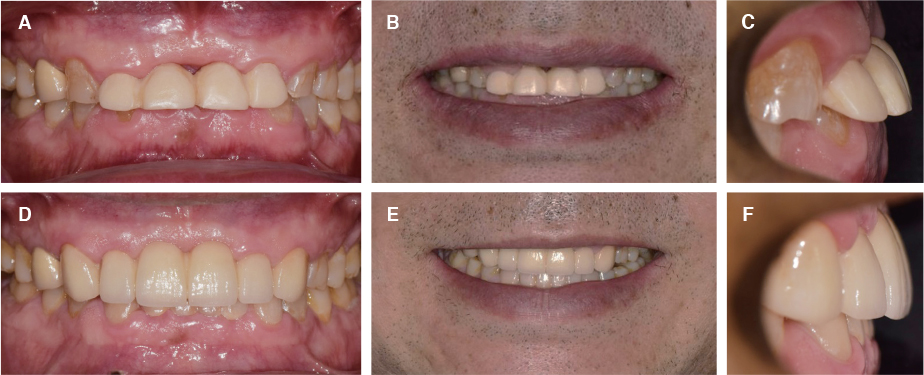J Korean Acad Prosthodont.
2018 Jan;56(1):40-49. 10.4047/jkap.2018.56.1.40.
Functional and esthetic improvement through systematic diagnosis and treatment procedures in patient with unaesthetic anterior teeth proportion because of tooth wear: A case report
- Affiliations
-
- 1Department of Prosthodontics, School of Dentistry, Dankook University, Cheonan, Republic of Korea. ys997695@naver.com
- KMID: 2402986
- DOI: http://doi.org/10.4047/jkap.2018.56.1.40
Abstract
- It is reported that the causes of unaesthetic proportion of anterior teeth vary widely. Especially, when the unaesthetic tooth proportion of the mandibular incisors arises due to the wear of the anterior teeth accompanied by the compensation of the alveolar bone, it may cause serious functional and aesthetic problems. In such case, it should be considered that the evaluation of vertical dimension and tooth proportion as well as smile line, soft tissue and hard tissue morphology. And, increase of vertical dimension or clinical crown lengthening followed by prosthodontic restorations is needed to improve the interdental mesial/distal, width/length ratio considering the anterior guidance. This case report demonstrates functional and aesthetic improvements through systematic diagnosis and treatment procedures in a 48-year-old male patient with unaesthetic anterior teeth proportion because of tooth wear accompanied by the compensation of alveolar bone and defect of several central incisors due to chronic periodontitis.
Keyword
MeSH Terms
Figure
Reference
-
1. Johansson A, Johansson AK, Omar R, Carlsson GE. Rehabilitation of the worn dentition. J Oral Rehabil. 2008; 35:548–566.
Article2. Berry DC, Poole DF. Attrition: possible mechanisms of compensation. J Oral Rehabil. 1976; 3:201–206.
Article3. Briggs P, Bishop K. Fixed prostheses in the treatment of tooth wear. Eur J Prosthodont Restor Dent. 1997; 5:175–180.4. Hemmings KW, Darbar UR, Vaughan S. Tooth wear treated with direct composite restorations at an increased vertical dimension: results at 30 months. J Prosthet Dent. 2000; 83:287–293.
Article5. Dawson PE. Functional occlusion from TMJ to smile design. 1st ed. Amsterdam: Elsevier;2008. p. 114–122.6. Turner KA, Missirlian DM. Restoration of the extremely worn dentition. J Prosthet Dent. 1984; 52:467–474.
Article7. Ochsenbein C, Ross S. A reevaluation of osseous surgery. Dent Clin North Am. 1969; 13:87–102.8. Schuyler CH. The function and importance of incisal guidance in oral rehabilitation. 1963. J Prosthet Dent. 2001; 86:219–232.9. Araujo NS, Moda MD, Silva EA, Zavanelli AC, Mazaro JV, Pellizzer EP. Survival of all-ceramic restorations after a minimum follow-up of five years: A systematic review. Quintessence Int. 2016; 47:395–405.10. Ahmad I. Anterior dental aesthetics: facial perspective. Br Dent J. 2005; 199:15–21.
Article11. Dong JK, Jin TH, Cho HW, Oh SC. The esthetics of the smile: a review of some recent studies. Int J Prosthodont. 1999; 12:9–19.12. Monteith B. The role of the free-way space in the generation of muscle pain among denture-wearers. J Oral Rehabil. 1984; 11:483–498.
Article13. Orthlieb JD, Laurent M, Laplanche O. Cephalometric estimation of vertical dimension of occlusion. J Oral Rehabil. 2000; 27:802–807.
Article14. Park JH, Jeong CM, Jeon YC, Lim JS. A study on the occlusal plane and the vertical dimension in Korean adults with natural dentition. J Korean Acad Prosthodont. 2005; 43:41–51.15. Willis FM. Features of the face involved in full denture prosthesis. Dent Cosmos. 1935; 77:851–854.16. Mohamed SE, Christensen LV. Mandibular reference positions. J Oral Rehabil. 1985; 12:355–367.
Article17. Silverman MM. The speaking method in measuring vertical dimension. 1952. J Prosthet Dent. 2001; 85:427–431.18. Coslet JG, Vanarsdall R, Weisgold A. Diagnosis and classification of delayed passive eruption of the dentogingival junction in the adult. Alpha Omegan. 1977; 70:24–28.
- Full Text Links
- Actions
-
Cited
- CITED
-
- Close
- Share
- Similar articles
-
- Full-mouth rehabilitation with increasing minimum vertical dimension in the patient with severely worn dentition and deep bite
- Esthetic improvements through systematic diagnosis and treatment procedures in patients with unesthetic maxillary anterior teeth proportion after orthodontic treatment: Case report
- Anterior esthetic restoration accompanied by gingivectomy of patient with unesthetic tooth proportion of maxillary anterior teeth: a case report
- Full mouth rehabilitation with vertical dimension increase in patient with loss of anterior guidance due to maxillary anterior teeth wear: A case report
- Full-mouth rehabilitation in an amelogenesis imperfecta patient with anterior open bite using CAD/CAM system

















